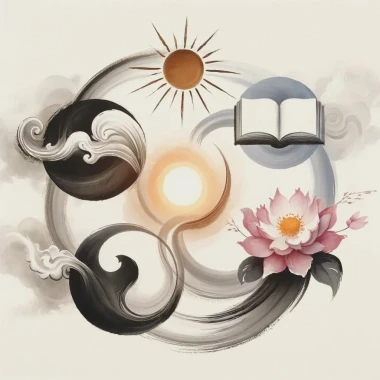A disciple of the noble ones is wealthy when ... (SN 55.44) ( lemmy.world )
"Bhikkhus, a disciple of the noble ones endowed with four qualities is called 'wealthy, of great wealth, of great possessions.'
Which four?
-
Here, bhikkhus, a disciple of the noble ones is endowed with experiential confidence in the Buddha — Indeed, the Blessed One is the Worthy One, perfectly enlightened, accomplished in true knowledge and conduct, fortunate, knower of the world, unsurpassed leader of persons to be trained, teacher of gods and humans, enlightened, blessed;
-
endowed with experiential confidence in the teachings of the Buddha — Indeed, the Dhamma is well proclaimed by the Blessed One, directly visible, immediate, inviting verification, leading onward, to be personally experienced by the wise;
-
endowed with experiential confidence in the Sangha — Indeed, the Sangha of the Blessed One’s disciples is practicing the good way, practicing the upright way, practicing the knowledgeable way, practicing the proper way; these are the four pairs of persons, the eight types of individuals - this Sangha of the Blessed One’s disciples is worthy of gifts, worthy of hospitality, worthy of offerings, worthy of reverential salutation, the unsurpassed field of merit for the world;
-
endowed with the virtues dear to the noble ones, complete, pure, free of blemish, spotless, liberating, praised by the wise, beyond reproach, conducive to collectedness (concentration).
Indeed, bhikkhus, a disciple of the noble ones endowed with these four qualities is called 'wealthy, of great wealth, of great possessions.'"
The four qualities described in this teaching are gradually developed as one verifies the teachings through reflection and close examination, and/or by applying the teachings for a period of time to observe for improvements to the condition of the mind.
Related Teachings:
7 kinds of wealth (AN 7.6) - In this teaching, the Buddha shares seven spiritual qualities that constitute true wealth. Part of the understanding the five aggregates and their grasping is for one to deeply reflect on how the mind relates to the world.
What is the stream and who is a stream-enterer (SN 55.5) - A dialogue between the Buddha and Sāriputta on the four factors for stream-entry: 1.) association with good people, 2.) hearing the true teaching, 3.) wise attention, and 4.) practice in accordance with the teaching. Sāriputta also defines the "stream" and the "stream-enterer" and the Buddha approves of his answer.
